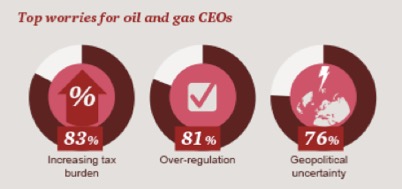Production Sharing Agreements (PSAs) are one of the most common structures used to regulate exploration and production of oil and gas reserves. PSAs are often used across the developing world as they strike a balance between full nationalization of a country’s oil industry and other structures where royalties are assessed and taxes paid. In this issue of Egypt Oil & Gas, we will explore the subject in depth, giving particular attention to contracts’ length and benefits and limitations of cost recovery.
Many countries are stuck. As they do not have the expertise to exploit reserves themselves, they are forced to bring in foreign firms with the necessary equipment and experience to do so for them. While these international firms are capable of developing the resource without outside assistance, governments also have a significant interest in controlling aspects of production in the field, making sure that taxes and environmental regulations are enforced. PSAs are a way to satisfy the differing requirements between international oil companies (IOCs) and nations.
History and alternatives
The PSA system was first introduced in the mid-1960s in Indonesia. The contract was developed as a way to uphold national ownership of natural resources while still allowing IOCs to develop them. As these contracts are simple and place much of the cost and risk of E&P squarely on IOCs, they rapidly grew in popularity. They quickly became the predominant type of contract used in South America, Asia, and the Middle East. Egypt is no exception, and since the early 1970s the country has operated most of their concessions using the PSA model.
Previously the most popular contract type used internationally was the simple Concessions Contract. First developed in the 18th century during the American Oil Boom, these contracts are based on land ownership. Entities (generally governments) grant concessions –essentially ownership– to tracts of land or geographic areas. Whatever resources found below are the property of the concession-holder. This type of contract is attractive for its simplicity, and for IOCs they can be quite lucrative. However, when these contract terms are agreed on, actual reserves present are generally unknown. This results in more cautious bidding by IOCs for exploration blocks, and as such, the state ends up with lower revenues.
Two other types of contracts used instead of PSAs are Service Contracts and Participation contracts. In Service Contracts, the oil companies never actually own the resources they are extracting, but instead are simply paid a fee by the government for their work. Participation contracts are used when the state and an IOC develop the resources together. While they have the advantage of jointly sharing all risk in E&P, they require agreement on all aspects of the E&P process that can lead to lengthy delays if one party disagrees with the other.
Model of stability
Egypt has a long history of utilizing PSAs for developing concessions. Maurizio Coratella, General Manager of Edison Egypt –an Italian energy firm– said that the industry has remained committed to Egypt as the country has remained quite stable over the last 50 years of development. One way that Egypt has distinguished itself as an attractive place for development is because when firms come and invest, their PSA agreements are enacted into law. “Investors have always found Egypt to be a country they could rely on as one with a stable legal framework. This framework has always given a lot of confidence because PSAs are laws,” said Coratella. Corporations and international firms have confidence that their investments and agreements with Egypt are protected and upheld by national law. Even as neighbors such as Libya or Algeria have experienced (and are currently experiencing) years of unrest and economic disquiet, Egypt has proactively worked to insure that the oil and gas industry —a major contributor to GDP at 15.3% according to the Oxford Business Group— is insulated as much as possible from disruption.
“PSAs are the best model agreement for countries like Egypt; according to the country’s mineral resources law, all the country’s mineral resources belong to the state,” said Nasser Wali, Deputy Assistant CEO for Agreements at EGPC.
In Egypt, IOCs typically set up a Joint Venture (JV) with the government to begin the process of negotiations for concessions and bidding. They then use the JV as a vehicle to pay taxes on earnings, while a PSA is signed to regulate specific aspects of production. The contract model has a long and successful history in Egypt.
PSA challenges
While PSAs are common, they are not without challenges. As PSAs in Egypt are enacted into law, IOCs can be certain that their investments in the country are safe and secure; these laws supersede previous agreements. However, this same structure can make it very difficult to negotiate or change specific terms of the contract later on as it requires the approval of the minister of petroleum and the parliament.
Contracts can be comprehensive, but due to the changing nature of oil production, they are never complete. This challenge exists within any type of contract, but it is especially cumbersome within PSAs in Egypt.
Another challenge facing PSAs is the financial risk carried by IOCs under the structure. According to PSA contract terms, all financial risk involved in exploration of potential resources is carried by IOCs. This structure works well for states as they never carry any risk when auctioning off blocks to be developed, thus avoiding public outcry if the block does not prove profitable. Generally the state assumes that the financial rewards for a discovery are lucrative enough to encourage development despite the risks. However, when the state artificially adjusts the market (i.e. oil subsidies, etc.) or when prices for Brent crude are too low, IOCs find the system restrictive.
During a time of depressed markets, financial risk carried by IOCs for exploration operations might need to be shared with the state. The Brent crude price can radically change the E&P environment for IOCs. Profit projections based on $100 a barrel quickly break down when oil drops to the lows recently seen (around $60 at time of printing). In such a market, risks carried by firms prove too prohibitive to be feasible for exploration.
A more flexible model
Within the last few years the Egyptian government has been more flexible with IOCs regarding specific terms of PSA contracts. The energy-starved nation is doing all it can to increase investment in the sector, and according to leaders in IOCs like Maurizio, it has worked hard to build mutually beneficial relationships with IOCs.
In order to increase production, the state has offered more generous percentages for profit and cost recovery, and has shown signs of willingness to change the price paid for natural gas, which is currently fixed and not competitive with international markets.
The fact is, the state and IOCs want different things. The Egyptian government wants to maximize production and revenue –especially as the nation is experiencing a shortage of natural gas; while IOCs want increased profitability. However, they both have to negotiate and work together because in the end, they both need each other. The state needs the expertise and capital of the IOC, while the IOC needs access to natural resources.
It is in periods of price instability that these different interests come to the forefront. But this is an opportunity to address them fully; making sure that the state is taking full advantage of its resources while IOCs are compensated fairly for their work.
Working to improve the system
On the whole, PSAs are a structure that works very well for Egypt and for those investing in the nation. The contract structure has a long history of success for all involved. All who have been interviewed for this article (and the articles following this overview) were quick to state that for the most part, the system works quite well.
Egypt’s energy sector is arguably the most important sector for foreign direct investment (FDI) in the country. A recent report released by the US State Department stated, “The petroleum industry is one of the most dynamic industries in Egypt, and hydrocarbon production is by far the largest single industrial activity.”
Improvements and adjustments are always necessary for a field as important as energy to the Egyptian economy. Continually applying a critical eye to the way the sector operates will not only improve production and government-IOC relationships now, but will encourage further investment from additional foreign firms in the future. Recent efforts to reduce fuel subsidies and pay down foreign debt have instilled increased confidence in the Egyptian government. Continuing on the same track will undoubtedly lead to greater investment and production. As the US State Department says, “Should Egypt undertake these reforms, prospects for the industry will be bright, with untapped oil and gas resources and promising potential reserves.”








